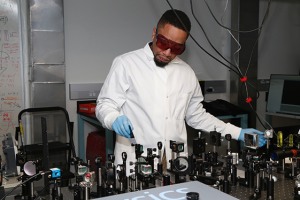The Brown University electrical and computer engineering (ECE) master's degree program offers in depth training in computer hardware, sensors, biomedical instrumentation, communications systems, control system, and more. The program is flexible and customizable to individual goals. Students in the program select courses from a range of topics within ECE. Students can also take courses in other disciplines including applied mathematics, medical science, and computer science. Students can engage in thesis research, experiential learning, and design projects in our state-of-the-art facilities including a nanotechnology cleanroom, advanced imaging suite, and community makerspace.
Brown University has nationally recognized and highly ranked programs in engineering, applied mathematics, medicine, and computer science. Brown faculty are involved in cutting edge, interdisciplinary research and scholarship while remaining deeply committed to teaching.
Students in the ECE master's program can study a broad range of ECE topics including:
- Computer Architecture and Embedded Systems
- Machine Learning and Pattern Recognition
- Computer Vision and Image Processing
- Electronic Materials and Devices
- Mixed-Signal Electronics and Analog/Digital Design
- Photonics, Plasmonics and THz
- Neuroengineering and Brain-Computer Interfaces
- Robotics and Industrial Automation
- Sensor Networks, Networked Systems and Signal Processing
- Wireless Communication & Power Transmission
Program of study
Master of Science – Non-Thesis Option
Students take a total of eight courses to satisfy the degree requirements. Students are expected to complete the Master of Science – Non-Thesis program option in three semesters, taking three courses in the first and second semesters, and two courses in the third semester.
Master of Science – Thesis Option
Students take a total of eight courses, including independent reading and research courses. Students are expected to complete the Master of Science – Thesis program option in four semesters, taking three courses in the first semester, two in the second and third semesters, and one in the fourth semester. Students can switch between degree options during the program for greater flexibility. Students interested in pursuing the Thesis option usually identify a faculty advisor during their first or second semester at Brown.
Master of Science – Professional Option
In addition to the course requirements, a paid or unpaid experiential learning experience of 3-6 months is a required component of the professional track program. Experiential learning can include a summer internship or completion of ENGN 2960 (Experiential Learning in Industry (ELI)) as an elective course. Assistance in obtaining internships will be provided by the School of Engineering and Career Services and Professional Development in the School of Professional Studies.
